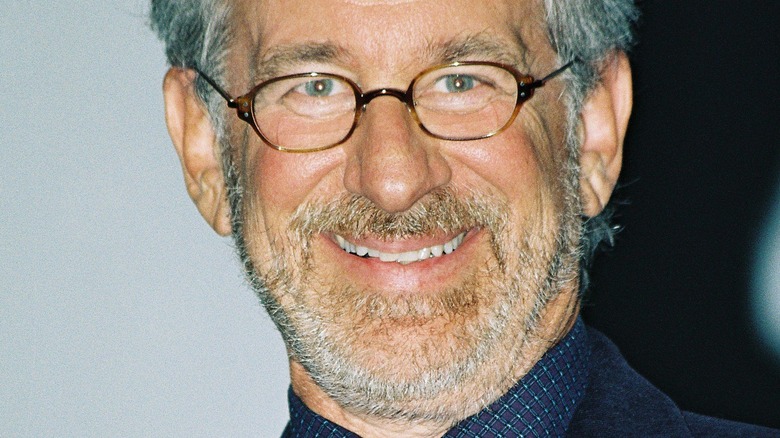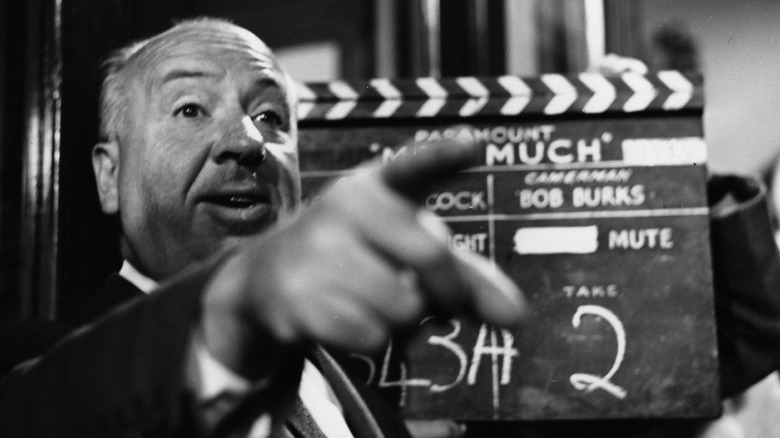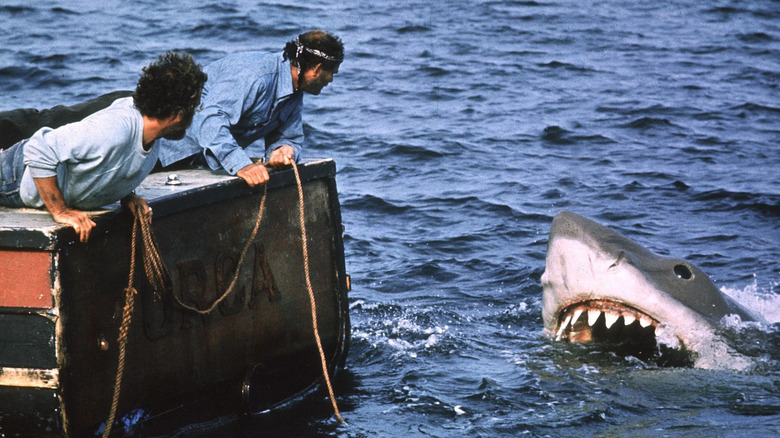Steven Spielberg Hates The Role Jaws Played In Increased Shark Killings
The 1975 megahit "Jaws" birthed a shark-fueled hysteria as people's fear of the ocean-dwelling predators was dialed up to one hundred, and director Steven Spielberg isn't happy about it. During an interview with the BBC's Desert Island (via The Hollywood Reporter), Spielberg opened up about filming the shark-led blockbuster and how director Alfred Hitchcock influenced some of the scariest moments in "Jaws," which featured a great white shark terrorizing a popular beachside town.
Following the release of "Jaws," shark hunting became a popular pastime that ultimately contributed to a decimation of sharks in the ocean (via BBC). Spielberg has expressed regret for villainizing the great white in his 1975 classic. The director joins Peter Benchley, author of the 1974 novel "Jaws" is based on, in voicing their displeasure at the effects "Jaws" had on influencing the public's perception of sharks as killing machines.
Spielberg's 1975 outing hails from a collection of classics from the esteemed director, including "West Side Story," "Jurassic Park," and "Indiana Jones." The director gave some insight into the process that helped him create his impressive repertoire, as well as his current legacy.
Alfred Hitchcock influenced the scariest shark scenes
The "Jaws" director revealed some of his favorite songs during his interview, as well as detailing some of the iconic figures that influenced his work, from Bruce Springsteen to Alfred Hitchcock. Hitchcock is regarded as one of Hollywood's earliest auteur directors, well-known for his signature style throughout his classic films — such as "Psycho," "The Birds," and "Rear Window."
"I had to be resourceful in figuring out how to create suspense and terror without seeing the shark itself," Steven Spielberg said. "Hitchcock did that, and I think Hitchcock was a tremendous guide for me in the way he was able to scare you without really seeing anything." The mechanical shark used in "Jaws" was notoriously unreliable, often breaking before the crew had to shoot scenes. This was something Spielberg had to work with when filming, often foregoing glimpses of the shark in favor of teasing its appearance in tense and suspenseful scenes.
"It was just good fortune that the shark kept breaking," Spielberg said. "It was my good luck, and I think it's the audience's good luck, too, because it's a scarier movie without seeing so much of the shark."
Jaws negatively influenced the public's perception of sharks
Given the public response to the 1975 classic, Steven Spielberg may have done too good of a job cementing the shark as a fearsome film figure in the same vein as Michael Myers from "Halloween" and Freddy Krueger from "The Nightmare on Elm Street." "That's one of the things I still fear — not to get eaten by a shark, but that sharks are somehow mad at me for the feeding-frenzy of crazy sport-fisherman that happened after 1975," Spielberg said. "To this day, [I] regret the decimation of the shark population because of the book and the film."
This craze Spielberg refers to was the massive increase of fishermen hunting sharks following the release of "Jaws." Many saw this uptick in hunting after "Jaws" as a major factor in the low number of sharks in the ocean, something Peter Blanchley agrees with and has apologized for (via The Hollywood Reporter). Blanchley has even campaigned to protect sharks following the film's release.
"Jaws" is currently available to stream on Netflix and Amazon Prime, or it can be purchased from Amazon Instant Video, Google Play and iTunes.


